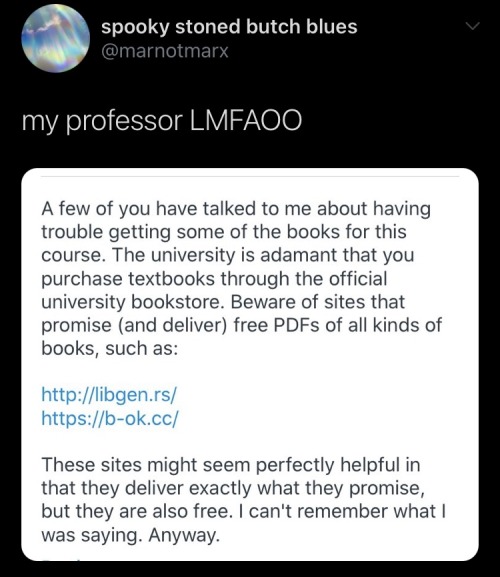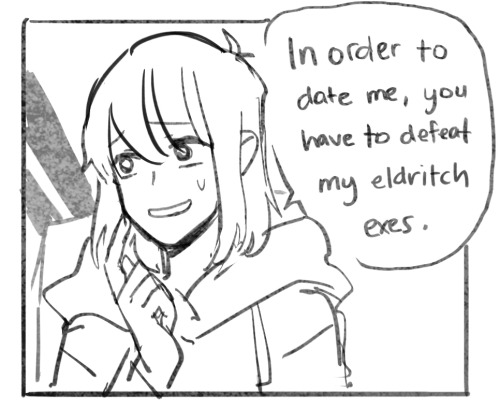This Got Me Dying
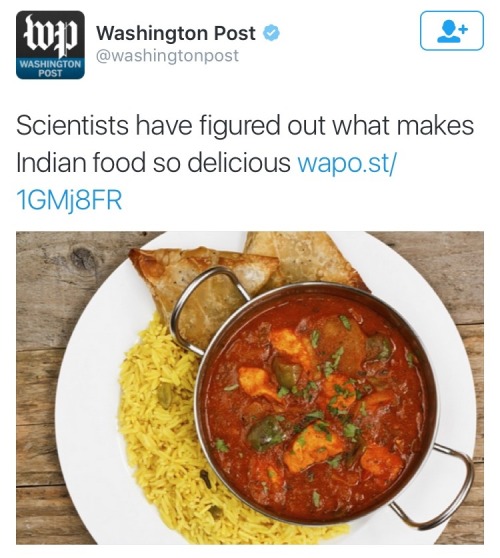
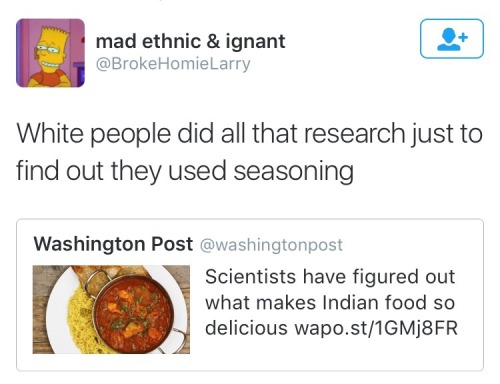
This got me dying
More Posts from Cardinalfandom and Others
Me when asked about my outstanding abilities




Writing Tips
Punctuating Dialogue
✧
➸ “This is a sentence.”
➸ “This is a sentence with a dialogue tag at the end,” she said.
➸ “This,” he said, “is a sentence split by a dialogue tag.”
➸ “This is a sentence,” she said. “This is a new sentence. New sentences are capitalized.”
➸ “This is a sentence followed by an action.” He stood. “They are separate sentences because he did not speak by standing.”
➸ She said, “Use a comma to introduce dialogue. The quote is capitalized when the dialogue tag is at the beginning.”
➸ “Use a comma when a dialogue tag follows a quote,” he said.
“Unless there is a question mark?” she asked.
“Or an exclamation point!” he answered. “The dialogue tag still remains uncapitalized because it’s not truly the end of the sentence.”
➸ “Periods and commas should be inside closing quotations.”
➸ “Hey!” she shouted, “Sometimes exclamation points are inside quotations.”
However, if it’s not dialogue exclamation points can ask be “outside”!
➸ “Does this apply to question marks too?” he asked.
If it’s not dialogue, can question marks be “outside”? (Yes, they can.)
➸ “This applies to dashes too. Inside quotations, dashes typically express—“
“Interruption” — but there are situations dashes may be outside.
➸ “You’ll notice that exclamation marks, question marks, and dashes do not have a comma after them. Ellipses don’t have a comma after them either…” she said.
➸ “My teacher said, ‘Use single quotation marks when quoting within dialogue.’”
➸ “Use paragraph breaks to indicate a new speaker,” he said.
“The readers will know it’s someone else speaking.”
I think it's an unrecognized practice to allow yourself to outgrow and shed versions of yourself that were more socially successful than who you want or need to be now. Not every new chapter is bigger and bolder and hotter, I think that's a very modern social media "glow up" mindset and doesn't actually have any room for what real transformation looks like. Sometimes we change exactly as we need to and it's not what anyone else was hoping for and that's part of it being important and true.
UNCONVENTIONAL NOVELS
[last updated Jan. 21, 2022]
(a list I put together… of lists I did not put together)
For those interested in techniques and genres that are outside of the mainstream market in the West/Americas, here’s a post of resources you can refer to for inspiration, research, or quiet support.
I believe there is no One Right Way to write a novel, and no one right way to present it either. Niche genres do exist, after all, and writing is an art form. Remember that writing “rules” are not a one-size-fits-all deal.
DISCLAIMER !! : Note there will be some overlap and you don’t have to like or agree with anything here. Also, while you may come across books by diverse authors, a lot of the ones listed here are old and probably written by white people, but BIPOC can and should be allowed to experiment with these, too. If content doesn’t interest you then maybe structure will. Form your own opinions.

but first, some recommended reading
Meander, Spiral, Explode: Design and Pattern in Narrative by Jane Alison - in this book, the author explores form and pattern through close readings of various (niche/unconventional) novels.
What is Postmodernism in Literature? - a brief Youtube video presented by Dr. Masood Raja (Postcolonialism channel); simple yet informative.
Wikipedia articles - antinovel | verse novel | defamiliarization | metafiction | digression (literary) | fragmentary novel | weird fiction | new weird | slipstream | experimental literature | postmodern literature | interactive novel | hypertext fiction | LitRPG | cybertext | New Sincerity |
I’ll continue to update this post over time or write up more.

anti-novels
No rules, no problems. Take all the tropes and conventions of the typical novel and bastardize them through chaos. Or throw them out and make your own.
Goodreads: list of 100+
Barnes & Noble: flex your reading muscles
Millions article: long live the anti-novel, built from scratch
a review of Subimal Misra’s work This Could Have Become Ramayan Chamar’s Tale: Two Anti-Novels
bizarre, weird fiction
If you ever wanted to read or write about cat men on Mars, or a bear who talks and plays the saxophone, or people with blue butts… Well, you can.
Book Riot: 100 strange and unusual novels
Bustle: 13 super strange books
Goodreads: Monster/Erotica books
Owlcation: 10 of the weirdest novels ever written
blog post by Z. Burns ft. 7 more weird books
experimental
Hard to define but generally more about form than content. Maybe you want half your story told in footnotes. Maybe your paragraphs are separated from the main body of text and dispersed all over the page. Maybe some of it is upside-down.
Goodreads list
Bustle: 10 experimental novels that aren’t hard to read
Standout Books: 5 experimental novels that will inspire any writer
(preview) Experimental Fiction: An Introduction for Readers and Writers Julie Armstrong
sparse plot / low conflict / books where “nothing happens”
Very basically, a plot is a sequence of events affected through cause-and-effect. In the West, audiences often expect there to be a linear series of conflicts that ultimately leads to a big “showdown”. This is not a universal narrative structure, and personally I would love to see more “cozy” fantasy novels that aren’t about saving the world or destroying an oppressive government.
Reddit recommendations - “a book where nothing happens”
Book Riot: in praise of plotless books
(blog) mundane and slice-of-life SFF recommendations
sketch story (wikipedia) | literary sketch (britannica)
“I would like to read a novel that is composed of numerous very interesting facts, but which nonetheless fails to cohere for me as a book.”
● source: (blog): I would like to read a dull plotless novel…
List Challenges: novels with no plot whatsoever
Reddit thread on slice-of-life/mundane speculative fiction
recommended reading
the significance of plot without conflict - an excellent post on the kishotenketsu structure, which is influenced by East Asian values such as unity and harmony over conflict and resolution.
what is iyashikei and why should you care? - often found in anime and manga, the purpose of this genre is to provide healing
Keep reading
WEBSITES FOR WRITERS {masterpost}
E.A. Deverell - FREE worksheets (characters, world building, narrator, etc.) and paid courses;
Hiveword - Helps to research any topic to write about (has other resources, too);
BetaBooks - Share your draft with your beta reader (can be more than one), and see where they stopped reading, their comments, etc.;
Charlotte Dillon - Research links;
Writing realistic injuries - The title is pretty self-explanatory: while writing about an injury, take a look at this useful website;
One Stop for Writers - You guys... this website has literally everything we need: a) Description thesaurus collection, b) Character builder, c) Story maps, d) Scene maps & timelines, e) World building surveys, f) Worksheets, f) Tutorials, and much more! Although it has a paid plan ($90/year | $50/6 months | $9/month), you can still get a 2-week FREE trial;
One Stop for Writers Roadmap - It has many tips for you, divided into three different topics: a) How to plan a story, b) How to write a story, c) How to revise a story. The best thing about this? It's FREE!
Story Structure Database - The Story Structure Database is an archive of books and movies, recording all their major plot points;
National Centre for Writing - FREE worksheets and writing courses. Has also paid courses;
Penguin Random House - Has some writing contests and great opportunities;
Crime Reads - Get inspired before writing a crime scene;
The Creative Academy for Writers - "Writers helping writers along every step of the path to publication." It's FREE and has ZOOM writing rooms;
Reedsy - "A trusted place to learn how to successfully publish your book" It has many tips, and tools (generators), contests, prompts lists, etc. FREE;
QueryTracker - Find agents for your books (personally, I've never used this before, but I thought I should feature it here);
Pacemaker - Track your goals (example: Write 50K words - then, everytime you write, you track the number of the words, and it will make a graphic for you with your progress). It's FREE but has a paid plan;
Save the Cat! - The blog of the most known storytelling method. You can find posts, sheets, a software (student discount - 70%), and other things;
I hope this is helpful for you!
(Also, check my blog if you want to!)

The sugar bowl page from Austere Academy brightened up to the best of my ability and transcribed below:
It is a truth universally acknowledged that volunteers prefer their tea as bitter as wormwood and sharp as a two-edged sword, but few think to consider the true meaning behind that phrase. The [untrained or uninitiated] might assume that bitter tea means tea without sugar. But that assumes all sugar is sweet and all tea is bitter. In fact, there are many kinds of tea, that are not bitter at all, but sweet and fruity, usually identifiable by a whimsically [illegable] name and a box with a picture of an adorable animal wearing pajamas. So it stands to reason that, if not all tea is bitter, then not all sugar is sweet. The question we might ask is: why would sugar be bitter How would bitter sugar be created? And what greater purpose might bitter sugar serve? Lousy Lane, pg 678
THE SCHISM
[cutt off]
those hierarchies apart, and therefore instead of fixing one date for the schism, we may as well put a bracket around all of human history, and say: There! Are you happy? However, there is one thing that all sources seem to agree on: there is a vital connection between the VFD schism and the most import part of a tea set. No, not the teapot. (see “Sugar Bowl”, above)
Some people claim that the schism divided VFD cleanly in two, with one side devoted to starting fires, and the other devoted to putting them out. But of course, it is rare for anything to divide so neatly, with the exception of a particular sort of semi-soft cheese (see “Gorgonzola”, pg 401). No, it is far more likely
[cut off]
remain shrouded in mystery, including the circumstances of its creation, we can only speculate at the connection between city’s official organization and its similarly-named counterpart. Some sources claim that the chief of the Offical Fire Department was a close blood relation of a prominent member of VFD, though this fire chief has stubbornly refused to answer to any of our questions, on account of being deceased.
Finally, there is much debate regarding the exact cause of the schism. While most experts agree that it stemmed from what one might politely call “philosophical differences” the truth is that these differences had been churning under the surface of VFD for some time, even going back to the organization’s very name. After all, while might assume that the phrase “fire department” would obviously refer to an organization that puts out fires, thus protecting highly flammable literary materials, the phrase could just as easily refer to an organization that prefers to start fires and burn books (see: Bradbury, Ray pg 451). Still, let’s take a moment to theorize about those philosophical differences. Volunteers claim to be acting for the greater good, but philosophers who speak to the concept of moral relativity would be quick to point out that words such as “good”, “evil”, “delicious” and “sandwich” can be ascribed different meanings, depending on the value system and dietary preferences of the
[cut off]
Glaze is out!
Tired of having your artwork used for AI training but find watermarks dismaying and ineffective?
Well check this out! Software that makes your Art look messed up to training AIs and unusable in a data set but nearly unchanged to human eyes.
I just learned about this. It's in Beta. Please read all the information before using.
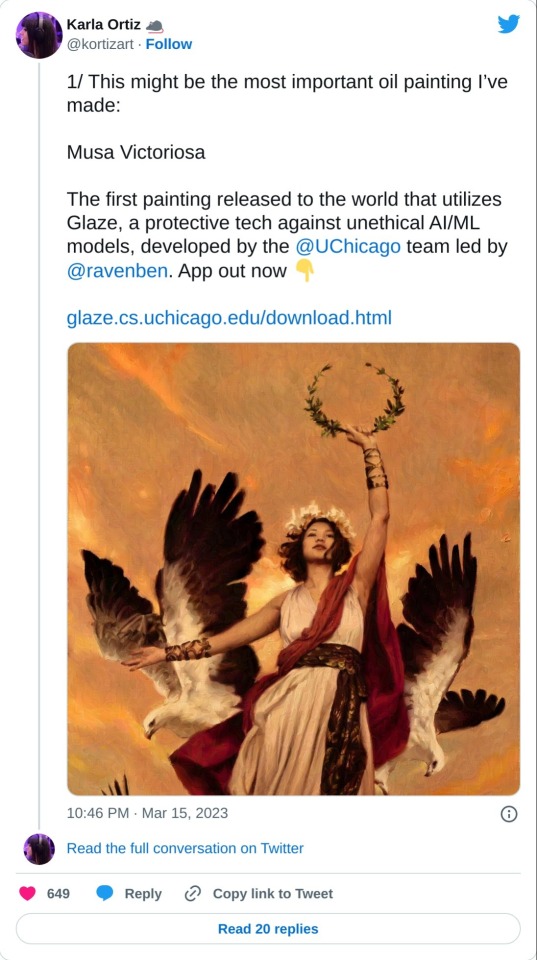
-
 raaafl reblogged this · 1 week ago
raaafl reblogged this · 1 week ago -
 smol-civet liked this · 3 weeks ago
smol-civet liked this · 3 weeks ago -
 loup-warrrior93 reblogged this · 2 months ago
loup-warrrior93 reblogged this · 2 months ago -
 manorinthewoods liked this · 2 months ago
manorinthewoods liked this · 2 months ago -
 dangerousskeletoncoptree reblogged this · 2 months ago
dangerousskeletoncoptree reblogged this · 2 months ago -
 stuff536363 reblogged this · 3 months ago
stuff536363 reblogged this · 3 months ago -
 toomanyfandoms11 liked this · 3 months ago
toomanyfandoms11 liked this · 3 months ago -
 heystovepipeboys reblogged this · 3 months ago
heystovepipeboys reblogged this · 3 months ago -
 seamarsol liked this · 3 months ago
seamarsol liked this · 3 months ago -
 starrydivinitysblog reblogged this · 3 months ago
starrydivinitysblog reblogged this · 3 months ago -
 jumbleverse reblogged this · 3 months ago
jumbleverse reblogged this · 3 months ago -
 misslaneyberry liked this · 3 months ago
misslaneyberry liked this · 3 months ago -
 twinscythe liked this · 3 months ago
twinscythe liked this · 3 months ago -
 bitchycatwizard reblogged this · 3 months ago
bitchycatwizard reblogged this · 3 months ago -
 cowboy-sparkles reblogged this · 3 months ago
cowboy-sparkles reblogged this · 3 months ago -
 casscainsbiceps reblogged this · 3 months ago
casscainsbiceps reblogged this · 3 months ago -
 fish-that-yells liked this · 4 months ago
fish-that-yells liked this · 4 months ago -
 mindlessbc liked this · 4 months ago
mindlessbc liked this · 4 months ago -
 kitefreecss reblogged this · 4 months ago
kitefreecss reblogged this · 4 months ago -
 fennamble liked this · 4 months ago
fennamble liked this · 4 months ago -
 skamimikyu reblogged this · 4 months ago
skamimikyu reblogged this · 4 months ago -
 quicksweetdreamer reblogged this · 4 months ago
quicksweetdreamer reblogged this · 4 months ago -
 quicksweetdreamer liked this · 4 months ago
quicksweetdreamer liked this · 4 months ago -
 verglasnightshade liked this · 4 months ago
verglasnightshade liked this · 4 months ago -
 superpika1of4 reblogged this · 4 months ago
superpika1of4 reblogged this · 4 months ago -
 several-caterpillars liked this · 4 months ago
several-caterpillars liked this · 4 months ago -
 mimblizzy liked this · 4 months ago
mimblizzy liked this · 4 months ago -
 impossiblyatomictiger-blog reblogged this · 4 months ago
impossiblyatomictiger-blog reblogged this · 4 months ago -
 productivityrocks liked this · 4 months ago
productivityrocks liked this · 4 months ago -
 brokestudiesnrefs reblogged this · 4 months ago
brokestudiesnrefs reblogged this · 4 months ago -
 boyfeelxo liked this · 4 months ago
boyfeelxo liked this · 4 months ago -
 mirepoix-au-maigre liked this · 4 months ago
mirepoix-au-maigre liked this · 4 months ago -
 lithiumdoll reblogged this · 4 months ago
lithiumdoll reblogged this · 4 months ago -
 lithiumdoll liked this · 4 months ago
lithiumdoll liked this · 4 months ago -
 casscainsbiceps liked this · 4 months ago
casscainsbiceps liked this · 4 months ago -
 kingsnooz reblogged this · 4 months ago
kingsnooz reblogged this · 4 months ago -
 kingsnooz liked this · 4 months ago
kingsnooz liked this · 4 months ago -
 dreamtofswallowingcoins reblogged this · 4 months ago
dreamtofswallowingcoins reblogged this · 4 months ago -
 love-laugh-daydreamarevolt reblogged this · 4 months ago
love-laugh-daydreamarevolt reblogged this · 4 months ago -
 love-laugh-daydreamarevolt liked this · 4 months ago
love-laugh-daydreamarevolt liked this · 4 months ago -
 allthebooksandcrannies reblogged this · 4 months ago
allthebooksandcrannies reblogged this · 4 months ago -
 tiffanyweatherwax reblogged this · 4 months ago
tiffanyweatherwax reblogged this · 4 months ago -
 phantomas67 reblogged this · 4 months ago
phantomas67 reblogged this · 4 months ago -
 phantomas67 liked this · 4 months ago
phantomas67 liked this · 4 months ago -
 bug-in-a-porchlight reblogged this · 4 months ago
bug-in-a-porchlight reblogged this · 4 months ago -
 bug-in-a-porchlight liked this · 4 months ago
bug-in-a-porchlight liked this · 4 months ago -
 allthebooksandcrannies reblogged this · 4 months ago
allthebooksandcrannies reblogged this · 4 months ago -
 allthebooksandcrannies liked this · 4 months ago
allthebooksandcrannies liked this · 4 months ago -
 theaussiemoonchilde liked this · 4 months ago
theaussiemoonchilde liked this · 4 months ago
